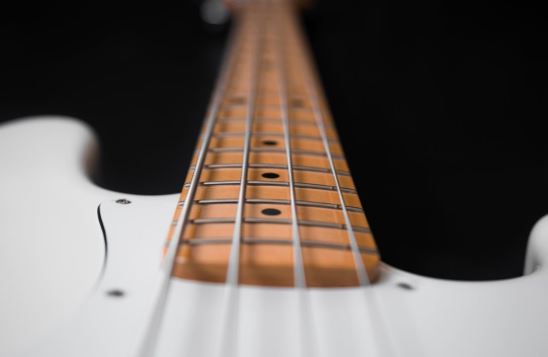Whether to play a bass or electric guitar is a dilemma that comes up a lot (we’ve recently talked about the 5 key differences between electric vs. acoustic guitar). To begin with, remember that you don’t have to play the same instrument for life. So choose the one that best fits you now, and if your preferences or needs change later on, you can always switch. The knowledge you gained on one of these instruments can be applied to playing the other, so there’s no pressure to make a permanent choice today. With a keen interest and some guitar/bass lessons, you’ll be great! With that out of the way, here are four questions you should consider when making your decision.
-
Do you want to play high or low?
A typical electric guitar has six strings with the lowest one being E (followed by A, D, G, B, and another E).
A typical bass guitar has just four strings, with the lowest one being E (followed by A, D, and G).
The bass is tuned to play these notes in a lower range (one octave lower) than what the same notes will get you on an electric guitar.
-
Do you want to play a support role in a band, or be front-and-center?
The bassist may not get all the attention, but plays a very important role in a band. Their deep sound balances out the other instruments perfectly. And with genres like jazz, they work with the drummer to keep the beat on track. Many introverts enjoy playing bass because they can focus on the music without the distraction of feeling like all eyes are on them every minute.
An electric guitarist is more likely to get to play front and center doing solos, or improvising and embellishing the music. Extroverts often love being a lead guitarist because they thrive on the attention. That being said, if you have your heart set on playing electric, but don’t want any extra attention, remember that you certainly don’t have to strive for being a lead guitarist — you can play more of a supportive role in the band, similar to what the bass player does.
-
Can you handle the higher weight of the typical bass guitar?
At the music shop, try holding a bass guitar, and then an electric. See what feels more comfortable to you. For example, if the bass clearly feels too heavy to you, then the electric guitar is a winning choice. If you can hold the bass comfortably, then use other factors to help make your decision.
-
Do you want more, or less, complexity when learning?
Since the electric has more strings, you’ll have to learn not only where more notes are, but how to combine them into chords. Bass players, on the other hand, are often tasked with playing simpler notes, one at a time.
Some players relish the potential for complexity with the electric, other prefer the dependable routine of playing bass.
Whether you choose a bass or electric guitar, “you’re gonna have fun”!
Don’t forget that one option isn’t any “worse” or “better” than the other in a general sense — all that matters is if your choice reflects your musical goals, likes, and preferences. As long as you keep what you want front and center during the decision process, you’re sure to have a lot of fun with your instrument.



